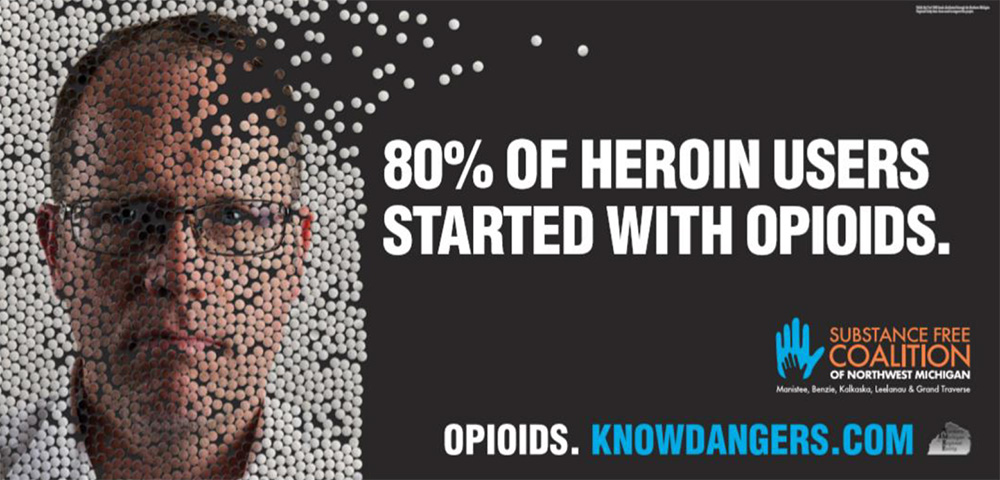Chemical engineering alumnus devotes post-retirement life to battling opioid epidemic
Ken Kaufman and his wife, Ellen, used to take their children, Jennifer and Brian, for long weekends in Lake City, a quaint Mid-Michigan town situated along Lake Missaukee. It's about 90 minutes from their home in Midland, which was also the home of Dow Corning, the largest silicone product manufacturer in the world. Kaufman spent his entire career with the company after graduating from Wayne State University in 1981 with a degree in chemical engineering.
In later years, as the kids grew and moved on, the couple often drove from Lake City to Traverse City for dinner or a show. They thought that perhaps Traverse City would be a good spot for retirement. They bought a cottage on Silver Lake and, in 2015, razed it to build a new house.
"The project became a good distraction," said Kaufman, a 2014 inductee into the College of Engineering Hall of Fame. "But some of it was very painful because we had plans to have an area of the house for our son and his family eventually."
The pain and the needed distraction, stemmed from the loss of Brian to a heroin overdose in April 2016.
The couple remains in Traverse City, where Kaufman - co-chair of the Substance Free Coalition of Northwest Michigan (SFC) - has made it his mission to combat an opioid crisis that claims the lives of more than 130 Americans every day.
"We've been putting a lot of our energy and focus into fighting this epidemic, by getting at the root cause," he said.

Brian first started using prescription opioids in high school after having his wisdom teeth removed. As addiction set in, he figured out ways to continue to get them on his own. He eventually went into treatment and cleaned up well enough to earn a chemical engineering degree from Michigan Tech.
But the addiction "never really left him completely," said Kaufman.
About a year after moving to Illinois for a process engineer job in a soybean plant, Brian began using heroin. He returned to Michigan and went into a 12-step program at the Brighton Center, where he spent six months in sobriety and free of opioids. It was after moving to a three-quarter house - which provided less supervision - that he had a relapse and fatally overdosed about a month short of his 26th birthday.
Unfortunately, Brian's story is one of many. In northern Michigan, the opioid death rate is higher than the national average. The SFC was formed in 2016 by concerned citizens in the Grand Traverse region. Kaufman's main contribution to the coalition is the development and implementation of a strategy to prevent new opioid addictions by educating people about the dangers of prescription opioids and alternatives to pain management.
The Know Dangers Opioid Prevention Initiative includes an ADDY-award winning multi-year, multi-media general public awareness campaign (featuring Kaufman's wife Ellen and others) in television and radio spots, on billboards and posters, and in social media.
"We want students, parents and everyone to know what we've learned about prescription opioids, how they are same as heroin and non-opioid alternatives to manage pain," said Kaufman. "If you never take them, you never run the risk of becoming addicted and the consequences of dealing with that for the rest of your life."

After graduating from high school in St. Clair Shores, Kaufman worked at a Chrysler parts plant in Warren. Four years later, he started taking science and math courses at Macomb Community College, and soon received a merit scholarship to attend Wayne State University.
Kaufman was interested in packaging engineering based on his experience at Chrysler, and was advised to pursue a degree in chemical engineering.
"A counselor at Macomb said that chemical engineers tell packaging engineers what to do," he said.
While continuing to work at Chrysler, Kaufman maintained full-time status as a student as well as a B average to honor his scholarship. In the late 1970s, amid the automaker's financial troubles, he was laid off. The silver lining was that he was able to take more classes while receiving 95% of his pay through UAW unemployment benefits.
"I went from 12 credit hours to 20 or 22 per semester and was able to finish on a normal schedule," he said.
Kaufman's memories of Wayne State include experiences as a member of the American Institute of Chemical Engineers, Tau Beta Pi and the Engineering Society of Detroit. He also fondly recalls the influence of Wayne State alumnus and professor Harold Donnelly, a five-time recipient of the College of Engineering's Excellence in Teaching award.
"He was a mentor to a lot of us and really taught us how to be practical engineers," said Kaufman.
By graduation, Kaufman fielded offers from General Motors, including an opportunity to work at the Warren Tech Center in either the paint department or in catalytic converters. He wanted to be in a chemical plant, though, and took a job as a process design engineer at Dow Corning in 1981 - the early days of a 35-year career with the company.
Kaufman climbed the ranks to vice president of core manufacturing in 2008 and senior vice president of manufacturing, engineering and global operations in 2010. He earned an M.B.A. from Central Michigan University, served as president of the Michigan Chemistry Council Board of Directors and chaired Dow Corning's employee United Way campaign.
He also made an effort to stay connected to his alma mater. Kaufman strengthened Dow Corning's recruiting efforts at Wayne State, organized plant tours and discussed collaboration opportunities with faculty.
Ken's credentials and professional training position him well to impart a few words of advice to today's engineering students at Wayne State.
"At times during your career, you're going to be treated unfairly or decisions will be made by people that make mistakes," he said. "You need to be able to stay positive because the situation will always work out if you're a hard worker."

Kaufman retired four months after Brian passed away.
In addition to his efforts with the SFC, Kaufman is on the board of the local chapter of Families Against Narcotics (FAN). He is a board member and former treasurer of the local United Way and president of his lake association. He also enjoys being a grandfather to Jennifer's kids. But educating others on the dangers of prescription opioids through the SFC and FAN are the focus of his energy.
"The SFC supports the work of local county coalitions to achieve sustainable population-level reductions in substance use rates in Manistee, Benzie, Grand Traverse, Kalkaska and Leelanau counties," said Kaufman. "We sponsor initiatives across the region to leverage the impact and support initiatives within the individual county coalitions by providing a means of collaboration."
FAN was started in Fraser, Michigan - a city located about 25 miles northeast of Wayne State's campus in Midtown Detroit - by judge Linda Davis in 2007, a year in which the community suffered through 30 overdoses. The organization has since expanded to more than 20 chapters across the state, including the Grand Traverse Area chapter.
"Our FAN board meets once a month, and following the board meeting there's an open forum where people who are struggling with addiction can come and get advice from people that have either been through it or had some experience as parents of users," said Kaufman.
Some board members, like Kaufman, have lost children. Others are former drug users and judges who have presided over drug cases. All have a unique perspective and want to help in a constructive manner, lessening the focus on consequences and stigmas associated with addiction.
Kaufman is excited to see the effect these efforts have on reducing prescription opioid rates in Michigan, but notes that "it's not just us. The state has changed a lot of requirements around prescription opioids, and is part of a lawsuit holding opioid producers and others accountable. All of these collective efforts have had an impact. We have things heading in a more positive direction."
For more information on the Substance Free Coalition of Northwest Michigan, visit knowdangers.com. To learn more about FAN, visit familiesagainstnarcotics.org.